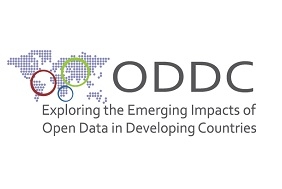Exploring the emerging impacts of Open Data in developing countries
Fecha de la noticia: 12-08-2016

Beginning in February 2013, the World Wide Web Foundation, with support from IDRC (Canadian International Development Research Centre) leads a research driven project entitled "Exploring the emerging impacts of Open Data in the developing country" (ODDC). During thirty months, the goals of this initiative are exploring how open data improves governance and strengthens civil rights; promoting the knowledge sharing and policies learning; developing and testing open data initiatives and investigating how standards, platforms and open data infrastructures impact on the re-use of open data in developing countries.
The initial phase of this project (ODDC1) was implemented through a seed funding granted by IDRC, part of the Open Data 4 Development network, and formed by seventeen grants to partners from 12 countries to carry out investigations in the field of governance and open data. In 2014, these projects were assessed to analyse the short term impact of these activities on the entities and the international open data policies.
Since the publication of the evaluation report, continuous, significant and positive outcomes have been obtained from the initiative such as, for example, the network created around the ODDC and formed by a large number of experts, developers and open data advocates from developing countries. However, the biggest change throughout all this time has been the great impact of the project on the open data policies and practices; improving the understanding of open data culture in the world and influencing the role of open data in the sustainable development of the poorest countries. In fact, the participating nations have begun to notice a change in the open data attitudes and policies; opening the door to new achievements in the future.
Methodology and findings after the initial phase
In order to measure the progress achieved in the first phase of this initiative, all research partners were surveyed electronically on key questions and follow-up interviews were conducted with 5 former research partners and two external experts; drawing the following conclusions:
- 74% of the partners claim that policy makers and other government actors have shown an increased understanding of open data and related concepts (like Right to Information).
- 60% of research partners surveyed have started working on other open data projects since joining ODDC and 74% of them have been establishing new alliances with third parties in OD field.
- 84% of organisations could identify cases where the ODDC research was being reused by others. It is still early days for measuring the spread of the research through academic outputs, however there is evidence of some of the papers beginning to be cited more widely in academic research.
- Before ODDC, the 75% of partners had very little or no knowledge of open data, now three quarters say they have significant experience in the sector.
- 83% of the partners feel that they are recognised by others as experts in the open data field, either in their national context or globally.
Thanks to this type of research projects, not only a positive change is made in local and regional open data tendencies, but journalists, companies, public officials and citizens may understand the meaning and benefits of the open data movement. Thus, it is possible to keep making progress in policies and programs that build a solid open data environment in those countries which are less developed in the release of public sector information.











